“Shining” a light on Kubrick’s horror masterpiece
“All work and no play makes Jack a dull boy.”
Original poster for the release of “The Shining” in 1980.
In celebration of Halloween night, Danville GTC Cinemas will be showing the cult-classic horror film The Shining at 4:00 pm and 7:00 pm.
The Shining is a good movie.
“Wow,” I hear you say, “What an astonishingly different opinion you have!”
Hear me out.
The Shining, originally released in 1980, is considered by many to be Stanley Kubrick’s directing opus and a masterclass in effective slow-burn horror. It’s a perfectly refined sense of creeping dread distilled into almost three hours of anxiety.
The different thing about The Shining was that at the time, it was like nothing that had been done before. Kubrick had dipped his hands into comedy, sci-fi, drama, and all other mixtures of genres, but this movie was Kubrick going somewhere else entirely.
It’s not like Texas Chainsaw Massacre, or Halloween, or The Exorcist. It’s a cerebral, intellectual horror that plays on your subconscious.
It starts with the little stuff.
Danny Torrance (played by Danny Lloyd) has a troubled-at-best relationship with his father and has a “little boy” who lives “in [his] mouth” that speaks through his curled up finger like a puppet. When prompted by a doctor, he immediately shuts up and doesn’t want to talk about the boy, named Tommy, anymore.
The Overlook Hotel layout makes no sense, when mapped out. Ballrooms, lobbies, and hallways are obviously too big to fit in the hotel shown in the exterior shots. In fact, the famous “Gold Room” was made specifically to look too big for the hotel.
Jack Torrance (played by Jack Nicholson) suffice to say, looks like he’s on the brink of a breakdown the entire time. The only time he is showing anywhere near a “normal” look is when he is talking to the hotel staff, and even then, it’s very obviously forced.
The movie lets these things rattle around in your mind. It takes its time with you. Everything from the atmospheric soundtrack that sounds like spoons in a garbage disposal to the way Jack’s eyes look like they’re dropping lower and lower on his head as he leans it forward contribute to the growing sense of uncomfortability that seems to emanate from the walls of the hotel.
Then it gets you.
After all of the buildup, the tiny string connecting Jack to his sanity snaps like a fraying wire and he’s gone completely. No matter what the theory you subscribe to regarding why he acts like he does, whether it’s the spirit of Native American burial ground the hotel was built upon or the hotel as a malevolent entity itself, what is not up for debate is that Jack Torrance is one of the most menacing people to ever be put on film reel.
Yet to overlook Wendy Torrance, Jack’s wife (played by Shelley Duvall), is to overlook an entirely different aspect of the movie.
In media, the “only sane man” trope is almost akin to an audience surrogate. This trope is in relation to characters that remain in a headstate similar to the audience’s; not exactly someone on the outside looking in, but someone with their head screwed on tight and thinking clearly about the events going on around them.
Wendy, for all of her hysterics, is the one who almost immediately notices that something is wrong, accepts the reality of that, and decides to take action. She gives Jack a few chances to stop and try to resolve things peacefully, and then when it seems like he isn’t, she just completely goes into self-defense mode and knocks him out with a baseball bat.
Is it enough to stop him? Of course not.
Does it only serve to irritate, and possibly mentally damage him further? Yes.
Is it amazing? Absolutely.
Wendy is a textbook example of a mother bear. Sure, she is weeping the entire time. Sure, Dick Halloran, the hotel chef who returns heroically at the end, is also a big part of the triumph. However, when the safety of her child is at risk, she does not stop until she and Danny are in the Snow-Cat and going as fast as possible in the opposite direction of the hotel. She doesn’t look back or try to redeem Jack because she knows he’s gone.
For all of the belittling and mental torture Kubrick put Shelley Duvall through, her performance of a housewife pushed to the breaking point is stellar.
Sure, Jack Nicholson is compelling. He’s downright terrifying.
But the reason I prefer Wendy is that Shelley Duvall shows that she is both a caring feminine mother and a strong woman who gets things done when the job calls.
She’s arguably the real star of the film.
The Shining is one of the horror movies that likes to make you think. It’s something that I love; a psychological horror film that isn’t scared of letting itself have some room to breathe. It’s one of my favorite films of all time for a reason.
It scares the daylights out of me.
Your donation will support the student journalists of Tunstall High School. Your contribution will allow us to purchase equipment and cover our annual website hosting costs.

Camron Beale is a senior at Tunstall, and it is his first year reporting for the Trojan Messenger. In the time between sleeping at school and...













Carter Mills • Nov 1, 2018 at 8:45 pm
Awesome work, Camron! Really loved the appreciation here for Shelley Duvall’s performance, she knocked it out of the park. Can’t believe she and Stanley Kubrick got nominated for Razzies when this movie first came out. Also, never noticed that detail about the hotel’s interior being way too big. The set design was always one of my favorite parts, thanks for making me appreciate it even more!